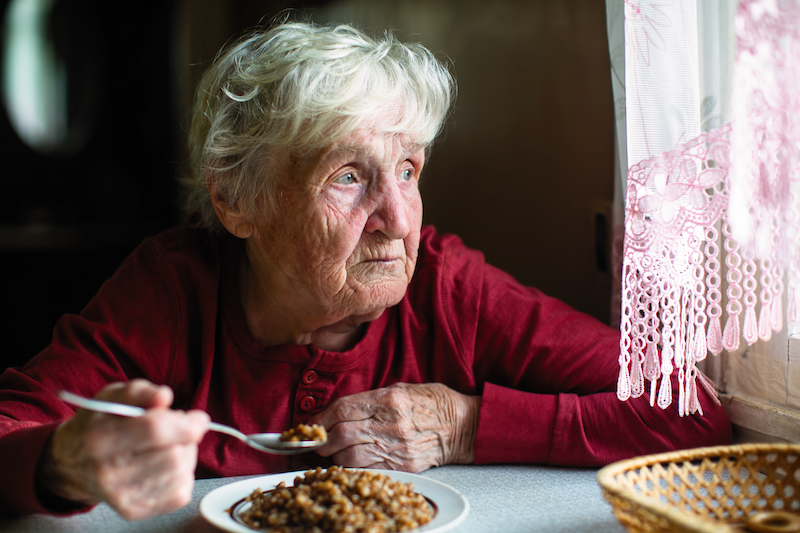
by Cindy Heilman | Leadership, Resident Centered Dining Service

According to the U.S. Census Bureau, approximately one-third of all older adults live solo. Many of these people are lonely, which can happen even when surrounded by others, as in a senior independent living community. Not all widows have the confidence to approach others to open conversations and make new friends. It isn’t easy for everyone to do.
It can be awkward for an older person, especially a woman, to enter a dining room alone. She may be fearful of asking to join a table and being rejected. This doesn’t apply to everyone, but enough to put up an alert flag.
Once the problem is recognized, it can be corrected. When you are educated, a trained food serving team, who sees the same resident daily, is aware of the dilemma, they can change an unhappy frame of mind to a confident, happy one by being social.
Training teaches your food servers how to open up conversations and introduce diners to others they know will be receptive. The recent pandemic affected many older adults who had busy lives with a circle of friends to share their thoughts and activities.
The pandemic ended with quarantines and the loss of their friends. Computers and Facetime only helped to hold on a bit.
When older people are living in social isolation, they often lose their appetite.
Losing weight brings declining health.
Stress and rising blood pressure follow loneliness to decrease their quality of life.
Your trained food serving team becomes a key factor when noticing plates of food not eaten and depletion of a response from the person they serve. They can reach out to build up the spirit of a resident by bringing good news, a little story to share, or just passing the time of day with a happy attitude.
One person on your food serving team can make a tremendous difference. Imagine what your entire team can do when they are educated to be alert to the dilemma.
Kind Dining♥ coaching series encourages empowering your staff with skills and tools to aid residents by connecting with them daily. This increases an engaged and purpose-driven staff and a resident population that is happier and healthier.
Providers investing time and energy will create career paths for all who participate, not just jobs to be tended to. Our excellent training series may influence younger staff and part-timers to consider staying in the senior care marketplace.
We teach how to combat loneliness with a support network of friends, family, and staff.
Opening conversations at mealtimes is a small item that plays an enormous role in social action that improves the lives of your residents and your food servers, too.
Be♥ Kind: Taking notice of a resident’s downward change in attitude can alert a problem.

by Cindy Heilman | Build Communities of Belonging, Resident Centered Dining Service

One of the huge negatives left behind after the pandemic faded is isolation.
So many residents who enjoyed the camaraderie of living in an independent living community still have that sense of being left out.
Many elders didn’t have a chance to bond with other residents to build friendships when the pandemic hit.
Now is the time to move back into routines of meeting friends for lunch or dinner or even to begin the day with conversation over coffee and bagels.
Again, this is a place where a food server can perform a vital service. Be on the lookout for a resident who needs a bit of assistance in meeting others. If you notice diners still taking meals in their rooms, suggest going down to the dining room.
Reassure them that you will introduce them to others you think will enjoy sharing a meal and some news of the day. It is a small kindness on the part of a food server that makes a huge difference to a resident. You will also be helping someone already in the dining room waiting to meet a person new to them. That small kindness will touch more than the one person you are helping.
When you perform this small kindness, watch the results with great satisfaction and the enjoyment of knowing you have created happiness that overflows and spreads to affect more than the one person you started with.
You also have a hand in keeping the people you serve healthier. Research has shown that loneliness may increase failing health where social connections to others can create overall immunity to illness.
Feeling left out and alone drags on your immunity which fights against disease. There is enormous power in fulfilling a small kindness.
Training employees to give their best behavior and to like the results of new skills they use, such as kindness shared is a major key to success.
Kind Dining♥ training turns your employees into the company’s most valuable assets.
Residents rely on your food servers in many ways which include being content to invite friends and family to join them at meals. It is noticeable when your food serving team cares enough about a diner in your community to extend intentional kindness.
We invite every employee within senior living communities to be cross-trained in our fun, focused, practical skills, and competencies, which makes each meal an enjoyable experience.
Be♥ Kind: Do you know loneliness lessens the immunity of an older person?

by Cindy Heilman | Leadership
 Remember when you were a little kid going to school and the teacher responded to your raised hand when you knew the answer? A friend was telling me about her memory.
Remember when you were a little kid going to school and the teacher responded to your raised hand when you knew the answer? A friend was telling me about her memory.
“I was learning to read in first grade. I raised my hand to read a sentence and my teacher, Mrs. Smith called on me by name. She took time to boost my self-esteem by easing me out of my shyness. She made me feel special by paying attention to me. Sometimes she would remark about my work or my hair, something personal. I’ll always remember her for it and it has been many decades ago. It gave me courage to speak out unafraid. There was always a nice comment written on my report card, too. Mom and Dad were delighted to read that. Of course, as I look back, I realize now what I didn’t realize then, that she made each one of us feel special.”
Remembering how you felt and responded to a kindness, even from as long ago as your young childhood can be turned into a guideline in present day food serving techniques. What made you feel special long ago will bring the same results with the seniors in your community dining room.
Memories are wonderful moments to call on when wanting to nurture the seniors your food servers attend at mealtimes. Be sincere. Encourage your staff to find just one little item about a senior that they can honestly compliment on. Advise them to watch the power of their words work. If the senior pays the compliment forward it could turn viral and you’ll have a full dining room of joyful, smiling seniors. The end result lifts the compliment giver’s spirit, too. They will feel happier, raising their own self esteem. Kind Dining® coaching helps your dining room staff to come by these techniques and incorporate them into their daily routines so they become as natural to them as breathing.
Paying personal attention to a senior at mealtime is a small matter that carries a long way. If the person is shy, it will give confidence and build trust between you. A small act of kindness will change a bad mood. Just being recognized will change your diner’s thoughts to positive ones. You may have just pulled a resident out of a depression, or at least brightened her way. It’s known that receiving a compliment ignites creativity and sometimes unblocks a thinking process. A compliment can bring on a smile which may turn into laughter and we all know that laughter burns calories?
Our B♥ Kind ® Tip: Happiness is contagious.






 Remember when you were a little kid going to school and the teacher responded to your raised hand when you knew the answer? A friend was telling me about her memory.
Remember when you were a little kid going to school and the teacher responded to your raised hand when you knew the answer? A friend was telling me about her memory.